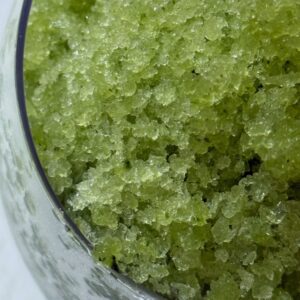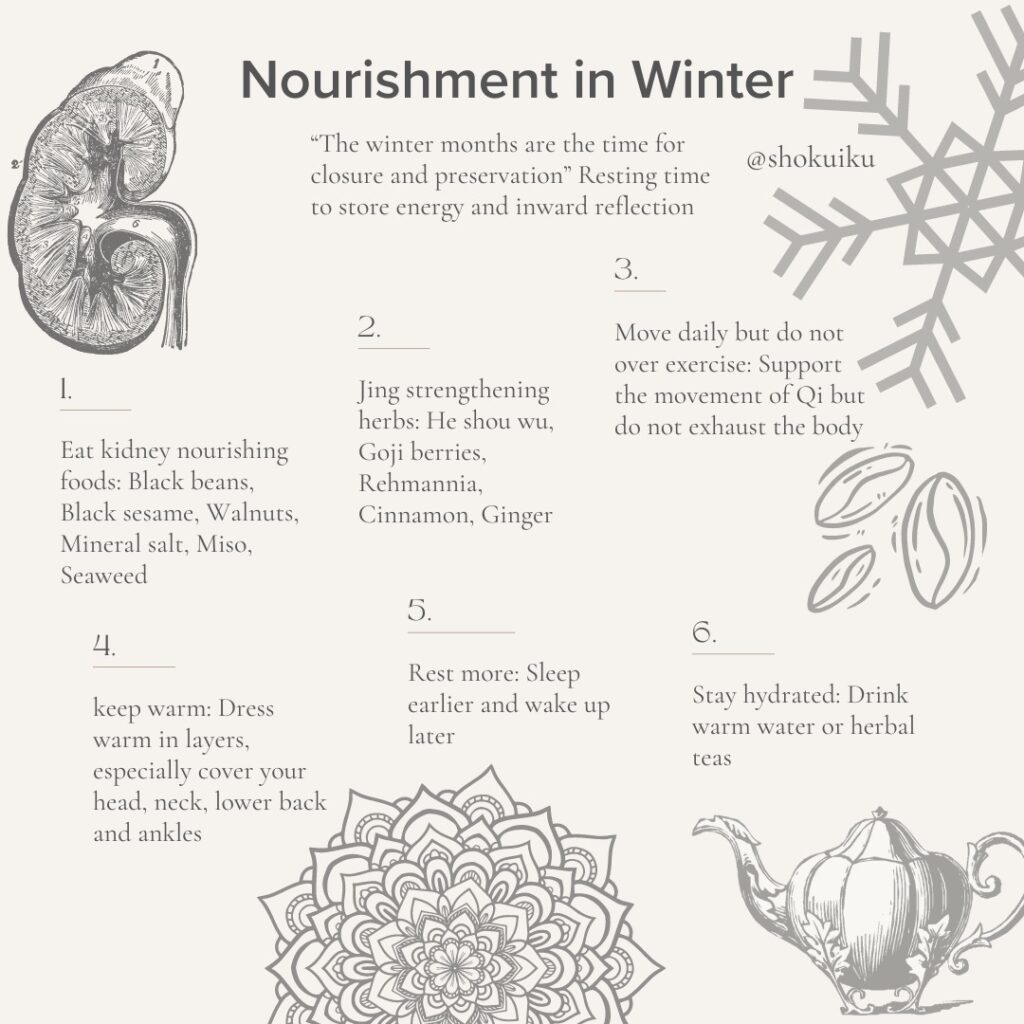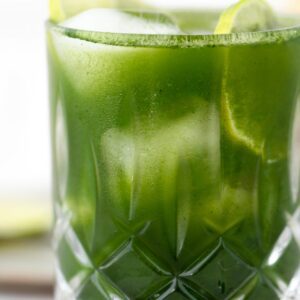
Cucumber & Tremella Granita
A Sicilian-style granita for hot days and hydrated cells When

Kick-start, energise, rejuvenate
All carefully planned and prepared to help nourish, reset and rejuvenate the body and mind.

From the perspective of Eastern Medicine, winter is a season of deep introspection and conservation. This time of year is characterised by the body’s natural inclination to turn inward, aligning with the principles of yin, which embody cold, darkness, and stillness. Unlike the yang energy of summer, which is all about light, heat, and activity, winter’s yin energy encourages rest, reflection, and preservation.
Winter is considered the “kidney season” in Traditional Chinese Medicine (TCM). The kidneys, seen as the root of vitality, store our essential life force or “jing.” This essence, inherited from our ancestors, is critical for growth, reproduction, and overall well-being. Nurturing and protecting the kidneys during winter is vital for maintaining health and balance throughout the year. The kidneys also play a crucial role in regulating water balance and ensuring the proper function of the body’s internal systems, especially endocrine response throughout the body, calcium metabolism and the maintenance of the bones.
The body’s functions slow down and energy is conserved during the colder months. This period of conservation is vital for replenishing the body’s resources and preparing it for the renewal of spring.
Herbal remedies, steeped in centuries-old traditions, are crucial for kidney health. In the realm of herbalism, the kidneys are regarded as key to sustaining vitality, pivotal in preserving balance and cleansing our internal systems.

Supportive Herbs for Kidneys:
Triphala – The trio of rejuvenating herbs Amalaki, Haritaki and Bibhitaki is nature’s miracle remedy. it fortifies the kidney tissues, improves plasma proteins, albumin, and creatinine, and enhances overall renal functioning.
Horsetail – boosts kidney health + lowers levels of uric acid (cause of kidney stones)
Goji berries – enhance kidney yin, helping to balance and restore vital essence. Goji berries also support jing, the body’s fundamental energy, promoting overall kidney health and longevity.
He shou wu – revered in TCM for its ability to strengthen and rejuvenate the kidneys. It nourishes the kidney yin and yang, balancing the body’s energy. This herb also supports the cleansing and detoxifying functions of the kidneys, enhancing their overall vitality and function.
Rehmannia – helps to nourish and cool the kidneys, reducing internal heat and inflammation. Rehmannia also supports the kidneys’ role in fluid regulation and promotes the maintenance of jing, vital for sustaining kidney health and energy.
STRENGTHEN IMMUNITY
The colder months are viewed as a time when the body’s yang energy withdraws inward. This inward movement can weaken the immune system if not properly supported.
strengthen immunity during this season:
Antiviral herbs play a crucial role in inhibiting viral development by bolstering the immune system and empowering the body to combat viral pathogens effectively.
Unlike some medications that target specific viruses and might become less effective over time as viruses change, strengthening the immune system provides a broader defence that can adapt to different viral threats.
Antiviral herbs offer more than just protection against viral infections and flu—they provide a myriad of additional health benefits. These include safeguarding cardiovascular health, supporting liver function, enhancing cognitive function, aiding digestion with their antioxidant-rich properties, and acting as anti-inflammatory agents.
Supportive Herbs for Immunity:
Cat’s Claw: Research suggests that Cat’s Claw contains compounds known as oxindole alkaloids, which have been shown to increase the activity of white blood cells, particularly T cells, thereby enhancing the body’s immune response. Additionally, studies have demonstrated that Cat’s Claw exhibits anti-inflammatory properties, further supporting its role in immune function.
Astragalus: Studies have found that Astragalus contains polysaccharides and saponins, which stimulate the production of white blood cells, such as macrophages and T cells, key components of the immune system. These compounds also enhance the activity of natural killer cells, which play a crucial role in defending the body against infections.
Reishi: Reishi mushrooms contain bioactive compounds like beta-glucans and triterpenes, which have been shown to modulate the immune system by increasing the production and activity of various immune cells, including T cells, B cells, and macrophages. Additionally, Reishi exhibits anti-inflammatory properties, which can further support immune function.
Chaga: Chaga mushrooms contain polysaccharides and polyphenols that have been found to enhance immune function by stimulating the production of immune cells, such as natural killer cells and T cells. Chaga also exhibits antioxidant and anti-inflammatory properties, which may help protect against immune system damage caused by oxidative stress and inflammation.
Pau d’Arco: Pau d’Arco contains compounds like lapachol and beta-lapachone, which have demonstrated antiviral and immune-stimulating effects in various studies. These compounds have been shown to enhance the activity of immune cells and inhibit the replication of viruses, supporting immune function.
Graviola: Graviola contains bioactive compounds such as acetogenins, which have been shown to enhance immune function by increasing the production and activity of immune cells, including T cells and natural killer cells. Additionally, Graviola exhibits antioxidant properties, which can help protect against oxidative stress and support overall immune health.
Echinacea: Echinacea contains compounds like alkamides and polysaccharides, which have been found to stimulate the activity of immune cells, such as macrophages and T cells, and enhance the production of cytokines, proteins that regulate immune responses. These immune-stimulating effects can help the body defend against infections and support overall immune function.
Garlic: Garlic contains bioactive compounds like allicin, which have been shown to exhibit antimicrobial properties against a wide range of pathogens, including bacteria, viruses, and fungi. Additionally, garlic has been found to stimulate the activity of immune cells, such as macrophages and lymphocytes, and enhance the production of cytokines, supporting immune function and defence against infections.
Oregano: It contains compounds such as carvacrol, thymol, and rosmarinic acid, which have been shown to exhibit antimicrobial effects against bacteria, viruses, and fungi. These compounds have been found to disrupt the cell membranes of pathogens, leading to their destruction. Additionally, oregano contains antioxidants like flavonoids and phenolic acids, which help neutralize harmful free radicals and reduce oxidative stress in the body.

A Sicilian-style granita for hot days and hydrated cells When

Ashitaba (Angelica keiskei) is often described as a “longevity herb.”

In our modern wellness landscape, “biohacking” often evokes images of
Copyright Shoku Iku © 2024 | All Rights Reserved.
The statements on this website have not been evaluated by the TGA or FDA. These products are not intended to diagnose, treat, cure or prevent any disease.
Sign up to receive your discount.